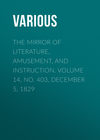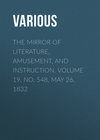Читать книгу: «The Mirror of Literature, Amusement, and Instruction. Volume 14, No. 403, December 5, 1829», страница 5
"The number of hands through which a common table knife passes in its formation is worthy of being known to all who use them. The bar steel is heated in the forge by the maker, and he and the striker reduce it in a few minutes into the shape of a knife. He then heats a bar of iron and welds it to the steel so as to form the tang of the blade which goes into the handle. All this is done with the simplest tools and contrivances. A few strokes of the hammer in connexion with some trifling moulds and measures, attached to the anvil, perfect, in two or three minutes the blade and its tang or shank. Two men, the maker and striker, produce about nine blades in an hour, or seven dozen and a half per day.
"The rough blade thus produced then passes through the hands of the filer, who files the blade into form by means of a pattern in hard steel. It then goes to the halters to be hafted in ivory, horn, &c. as may be required; it next proceeds to the finisher, to Mr. Rodgers for examination, and is then packed for sale or exportation. In this progression every table-knife, pocket-knife, or pen-knife, passes step by step, through no less than sixteen hands, involving in the language of Mr. Rodgers, at least 144 separate stages of workmanship in the production of a single pen-knife. The prices vary from 2s. 6d. per dozen knives and forks, to £10."
(To be concluded in our next.)
FUN
Monosyllables are always expressive, but seldom more comprehensive than in this instance. A thousand recollections of urchin waggeries spring up at its repetition. Our present example is "Skying a Copper," from Mr. Hood's Comic Annual, of which a copious notice will be found in the SUPPLEMENT published with the present number.
A REPORT FROM BELOW!
"Blow high, blow low."—Sea Song
As Mister B. and Mrs. B.
One night were sitting down to tea,
With toast and muffins hot—
They heard a loud and sudden bounce,
That made the very china flounce,
They could not for a time pronounce
If they were safe or shot—
For memory brought a deed to match
At Deptford done by night—
Before one eye appear'd a Patch
In t'other eye a Blight!
To be belabour'd out of life,
Without some small attempt at strife,
Our nature will not grovel;
One impulse mov'd both man and dame,
He seized the tongs—she did the same,
Leaving the ruffian, if he came,
The poker and the shovel.
Suppose the couple standing so,
When rushing footsteps from below
Made pulses fast and fervent;
And first burst in the frantic cat,
All steaming like a brewer's rat,
And then—as white as my cravat—
Poor Mary May, the servant!
Lord how the couple's teeth did chatter,
Master and Mistress both flew at her,
"Speak! Fire? or Murder? What's the matter?"
Till Mary getting breath,
Upon her tale began to touch
With rapid tongue, full trotting, such
As if she thought she had too much
To tell before her death:—
"We was both, Ma'am, in the wash-house, Ma'am, a-standing at our tubs,
And Mrs. Round was seconding what little things I rubs;
'Mary,' says she to me, 'I say'—and there she stops for coughin,
'That dratted copper flue has took to smokin very often,
But please the pigs,'—for that's her way of swearing in a passion,
'I'll blow it up, and not be set a coughin in this fashion!'
Well down she takes my master's horn—I mean his horn for loading.
And empties every grain alive for to set the flue exploding.
'Lawk, Mrs. Round?' says I, and stares, 'that quantum is unproper,
I'm sartin sure it can't not take a pound to sky a copper;
You'll powder both our heads off, so I tells you, with its puff,
But she only dried her fingers, and she takes a pinch of snuff.'
Well, when the pinch is over—'Teach your Grandmother to suck
A powder horn,' says she—Well, says I, I wish you luck.
Them words sets up her back, so with her hands upon her hips,
'Come,' says she, quite in a huff, 'come keep your tongue inside your lips;
Afore ever you was born, I was well used to things like these;
I shall put it in the grate, and let it burn up by degrees.'
So in it goes, and Bounce—O Lord! it gives us such a rattle,
I thought we both were cannonized, like Sogers in a battle!
Up goes the copper like a squib, and us on both our backs,
And bless the tubs, they bundled off, and split all into cracks
Well, there I fainted dead away, and might have been cut shorter,
But Providence was kind, and brought me to with scalding water
I first looks round for Mrs. Round, and sees her at a distance,
As stiff as starch, and looked as dead as any thing in existence;
All scorched and grimed, and more than that, I sees the copper slap
Right on her head, for all the world like a percussion copper cap.
Well, I crooks her little fingers, and crumps them well up together,
As humanity pints out, and burnt her nostrums with a feather;
But for all as I can do, to restore her to her mortality,
She never gives a sign of a return to sensuality.
Thinks I, well there she lies, as dead as my own late departed mother,
Well, she'll wash no more in this world, whatever she does in t'other.
So I gives myself to scramble up the linens for a minute,
Lawk, sich a shirt! thinks I, it's well my master wasn't in it;
Oh! I never, never, never, never, never, see a sight so shockin;
Here lays a leg, and there a leg—I mean, you know, a stockin—
Bodies all slit and torn to rags, and many a tattered skirt,
And arms burnt off and sides and backs all scotched and black with dirt;
But as nobody was in 'em—none but—nobody was hurt!
Well, there I am, a scrambling up the things, all in a lump.
When, mercy on us! such a groan as makes my heart to jump.
And there she is, a-lying with a crazy sort of eye,
A staring at the wash-house roof, laid open to the sky:
Then she beckons with a finger, and so down to her I reaches,
And puts my ear agin her mouth to hear her dying speeches,
For, poor soul! she has a husband and young orphans, as I knew;
Well, Ma'am, you won't believe it, but it's Gospel fact and true,
But these words is all she whispered—'Why, where is the powder blew'"
THE NATURALIST
MODE OF DESTROYING EAGLES
In those parts of the Highlands of Scotland where eagles are numerous, and where they commit great ravages among the young lambs, the following methods are used for destroying them:—When the nest happens to be in a place situated in the direction of a perpendicular from the edge of a cliff above, a bundle of dry heath or grass inclosing a burning peat is let down into it. In other cases, a person is let down by means of a rope, which is held above by four or five men, and contrives to destroy the eggs or young. The person who thus descends takes a large stick with him, to beat off or intimidate the old eagles. The latter, however, always keep at a respectable distance, for powerful as they are, they possess little of the courage which has in all ages been attributed to them, being in this respect much inferior to the domestic cock, the raven, the sea-swallow, and a hundred other birds. Sometimes eagles have their nests in places accessible without a rope, and instances are known of persons frequenting these nests, for the purpose of carrying off the prey which the eagles carry to their young. A very prevalent method by which eagles are destroyed, is the following:—In a place not far from a nest, or a rock in which eagles repose at night, or on the face of a hill which they are frequently observed to scour in search of prey, a pit is dug to the depth of a few feet, of sufficient size to admit a man with ease. The pit is then covered over with sticks, and pieces of turf, the latter not cut from the vicinity, eagles, like other cowards, being extremely wary and suspicious. A small hole is formed at one end of this pit, through which projects the muzzle of a gun, while at the other is left an opening large enough to admit a featherless biped, who on getting in pulls after him a bundle of heath of sufficient size to close it. A carcass of a sheep or dog, or a fish or fowl, being previously without at the distance of from twelve to twenty yards, the lyer-in-wait watches patiently for the descent of the eagle, and, the moment it has fairly settled upon the carrion, fires. In this manner, multitudes of eagles are yearly destroyed in Scotland. The head, claws, and quills, are kept by the shepherds, to be presented to the factor at Martinmas or Whitsunday, for the premium of from half-a-crown to five shillings which is usually awarded on-such occasions.—Edinburgh Literary Gazette.
THE PIED OYSTER CATCHER
This separate and single genus of birds is seldom seen amongst the numerous descriptions of wild fowl, which, in the winter seasons, wing their flight to our marshes. The most striking part of the Oyster-catcher is its bill, the colour of which is scarlet, measuring in length nearly four inches, wide at the nostrils, and grooved beyond them nearly half its length: thence to the tip it is vertically compressed on the sides, and ends obtusely. With this instrument, which in its shape and structure is peculiar to this bird, it easily disengages the limpets from the rocks, and plucks out the oysters from their half-opened shells, on which it feeds, as well as on other shell-fish, sea-worms, and insects.
W.G.C.
Покупайте книги и получайте бонусы в Литрес, Читай-городе и Буквоеде.
Участвовать в бонусной программе




















